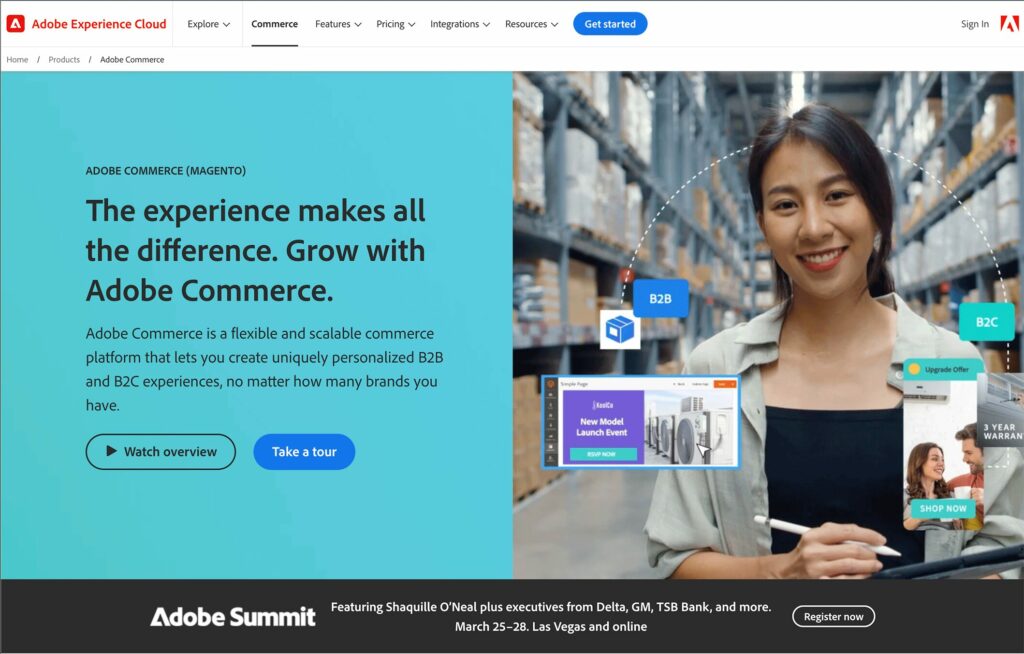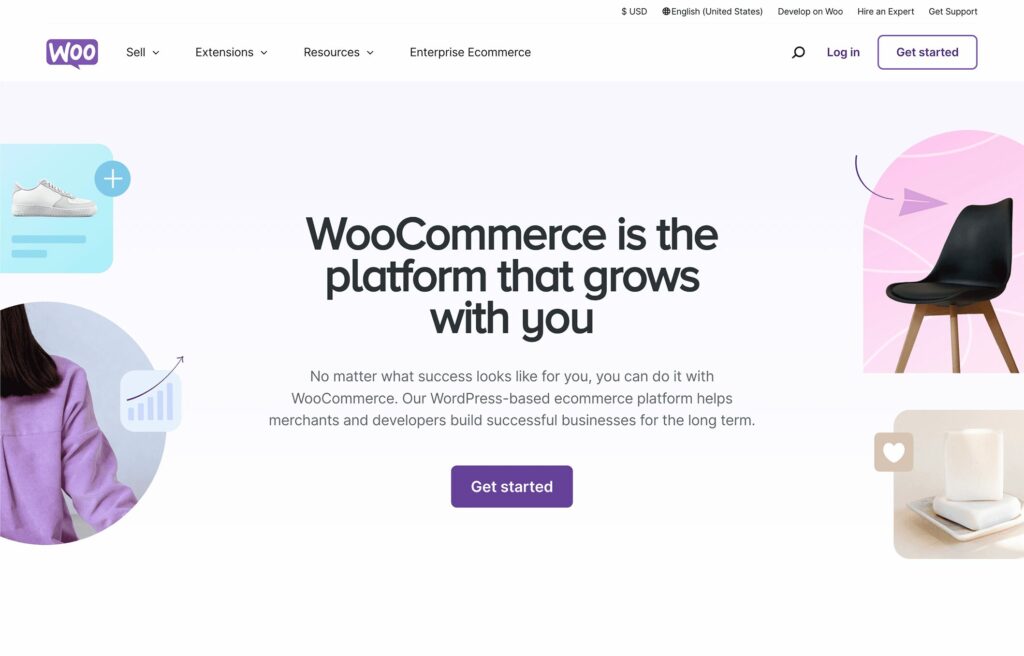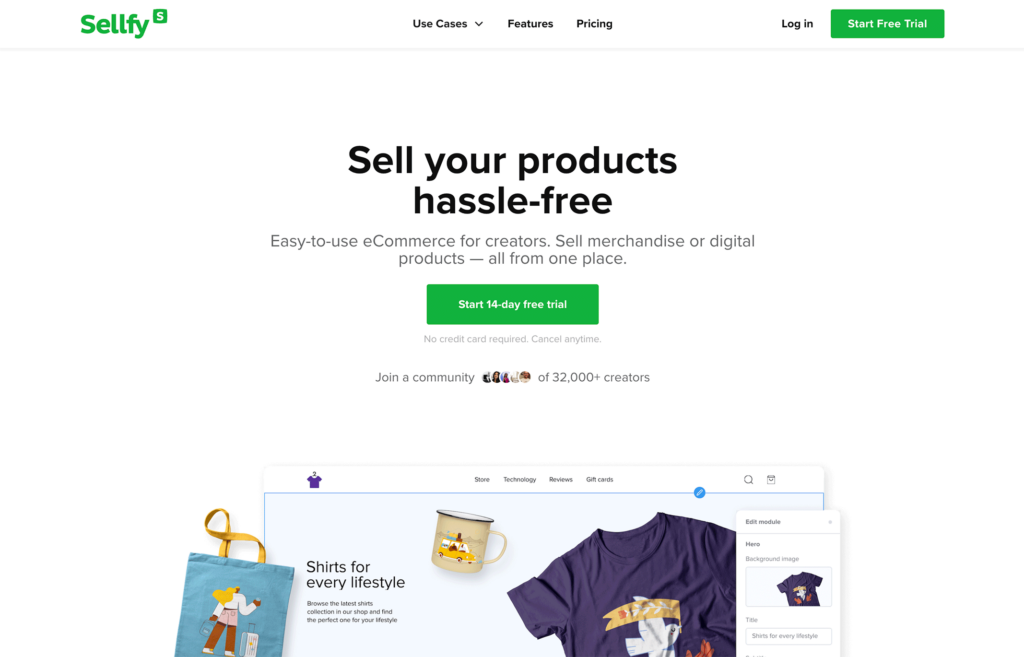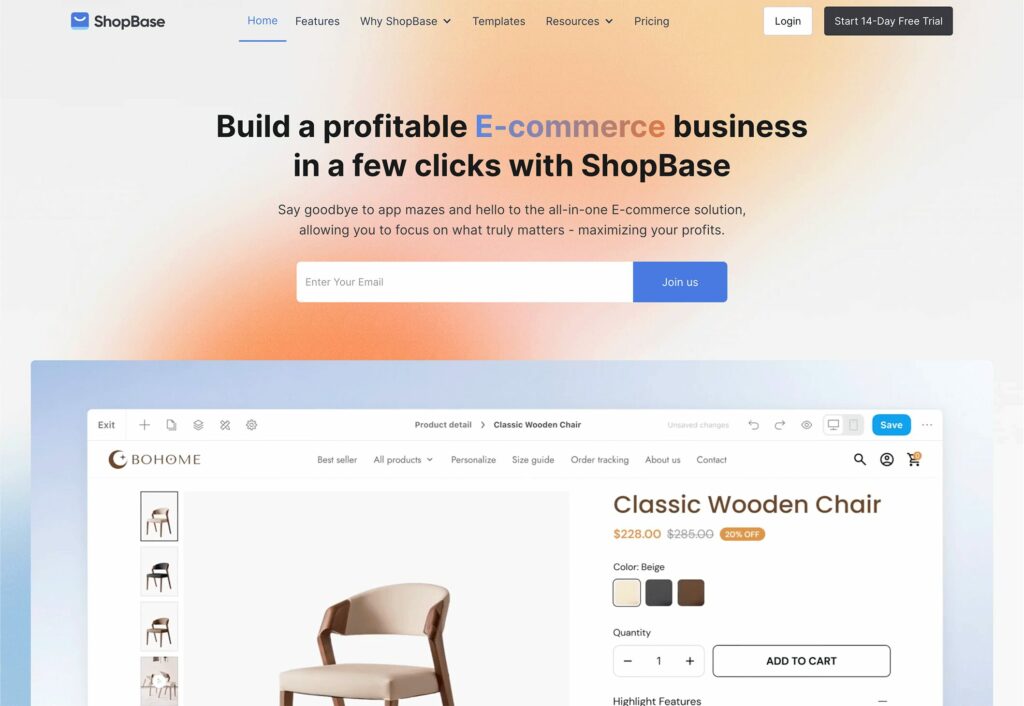In the bustling landscape of online commerce, choosing the right platform to launch your store can be a daunting task. With a plethora of options available, each boasting unique features and capabilities, it’s essential to delve deep into the strengths and weaknesses of the leading eCommerce platforms. In this comprehensive guide, we’ll explore thirteen of the top contenders: Shopify, BigCommerce, Magento, Zyro, Wix, Weebly, Square, WooCommerce, Squarespace, Ecwid, Shift4Shop, Sellfy, and ShopBase.
Shopify

What is Shopify?
Shopify is a cloud-based e-commerce platform that allows businesses to set up and run their online stores. Founded in 2006, Shopify has grown to become one of the most popular e-commerce solutions globally, serving millions of merchants in over 175 countries. Whether you’re a small boutique or a large enterprise, Shopify provides a robust set of tools and features to help you create, manage, and grow your online business.
Key Features of Shopify:
- Storefront Customization: Shopify offers a wide range of customizable themes and templates, allowing merchants to create visually stunning storefronts that reflect their brand identity.
- Easy Product Management: Adding and managing products on Shopify is intuitive and user-friendly, with features like bulk product editing and inventory tracking simplifying the process.
- Secure Payment Processing: With Shopify Payments or integration with third-party payment gateways, merchants can securely accept payments from customers around the world.
- Order Management: Streamline order processing with features like order fulfillment, shipment tracking, and automatic order confirmation emails.
- Marketing and SEO Tools: Boost your online visibility with built-in SEO tools, social media integration, and email marketing campaigns.
- Mobile Responsiveness: Shopify’s mobile-friendly design ensures that your store looks great and functions seamlessly on all devices.
- App Store: Access a vast ecosystem of third-party apps and integrations to extend the functionality of your Shopify store, from accounting and inventory management to customer support and marketing automation.
Pricing:
Shopify offers a range of pricing plans to suit businesses of all sizes and budgets:
- Basic Shopify: $29/month
- Shopify: $79/month
- Advanced Shopify: $299/month
In addition to these plans, Shopify also offers enterprise-level solutions for larger businesses with custom pricing.
Strengths:
- Ease of Use: Shopify’s user-friendly interface and intuitive setup make it easy for even non-technical users to launch and manage an online store.
- Scalability: Whether you’re just starting out or experiencing rapid growth, Shopify can scale with your business, offering advanced features and customization options.
- Reliability and Security: With 99.99% uptime and PCI compliance, Shopify provides a secure and reliable platform for online transactions.
- Wide Range of Integrations: The Shopify App Store offers thousands of third-party apps and integrations to enhance the functionality of your store and streamline business operations.
- 24/7 Customer Support: Shopify provides round-the-clock customer support via phone, email, and live chat, ensuring that help is always available when you need it.
Weaknesses:
- Transaction Fees: While Shopify offers competitive pricing plans, merchants may incur additional transaction fees if they choose to use third-party payment gateways.
- Customization Limitations: While Shopify’s themes and templates are highly customizable, some merchants may find themselves limited by the platform’s design constraints.
- Dependency on Third-Party Apps: While the Shopify App Store offers a wealth of third-party integrations, relying too heavily on external apps can add complexity and potential security risks to your store.
- Advanced Features Locked Behind Higher Plans: Some advanced features, such as real-time carrier shipping rates and advanced report builder, are only available on higher-tier pricing plans.
Pros:
- Easy to use and set up.
- Scalable for businesses of all sizes.
- Wide range of integrations and apps.
- Reliable and secure platform.
- Excellent customer support.
Cons:
- Transaction fees for third-party payment gateways.
- Customization limitations for advanced users.
- Dependency on third-party apps.
- Advanced features locked behind higher pricing plans.
Companies Using Shopify:
Many well-known brands and businesses across various industries trust Shopify to power their online stores. Some notable examples include:
- Gymshark – A fitness apparel and accessories brand.
- Kylie Cosmetics – The cosmetics brand founded by Kylie Jenner.
- Allbirds – A sustainable footwear company.
- MVMT – A watch and accessories brand.
- Heinz – The renowned food company.
Shopify offers a powerful and versatile platform for businesses looking to establish and grow their online presence. With its user-friendly interface, extensive feature set, and robust ecosystem of apps and integrations, Shopify empowers merchants to create unique and successful e-commerce experiences. While it may not be without its limitations, Shopify remains a top choice for businesses seeking a reliable and scalable e-commerce solution.
BigCommerce

What is BigCommerce?
BigCommerce is a leading cloud-based e-commerce platform that empowers businesses of all sizes to build, scale, and grow their online stores effortlessly. Founded in 2009, the platform has garnered recognition for its user-friendly interface, extensive customization options, and powerful tools tailored to meet the diverse needs of merchants.
Key Features of BigCommerce:
- Flexible Customization: BigCommerce offers a wide range of customizable templates and themes, allowing merchants to create visually stunning and unique online storefronts without the need for extensive coding knowledge.
- Multi-channel Selling: With BigCommerce, sellers can seamlessly integrate their online stores with popular marketplaces like Amazon, eBay, and social media platforms such as Facebook and Instagram, expanding their reach and maximizing sales opportunities.
- Powerful SEO Tools: The platform provides robust SEO features, including customizable URLs, meta descriptions, and built-in tools to optimize product listings, helping businesses improve their search engine rankings and drive organic traffic.
- Responsive Design: BigCommerce ensures that online stores are optimized for mobile devices, providing a seamless shopping experience across desktops, smartphones, and tablets.
- Built-in Marketing Tools: From email marketing and abandoned cart recovery to discount and promotional campaigns, BigCommerce offers a suite of built-in marketing tools to help merchants attract, engage, and retain customers.
- Secure Payment Processing: The platform supports multiple payment gateways, including PayPal, Stripe, and Square, ensuring secure and hassle-free transactions for both merchants and customers.
Pricing:
BigCommerce offers a range of pricing plans tailored to suit businesses of all sizes, from startups to enterprise-level corporations:
- Standard Plan: Starting at $29.95 per month
- Plus Plan: Starting at $79.95 per month
- Pro Plan: Starting at $299.95 per month
- Enterprise Plan: Tailored pricing available for enterprise-level businesses
Strengths:
- Scalability: BigCommerce provides scalable solutions that can accommodate the evolving needs of businesses, whether they’re just starting or experiencing rapid growth.
- Ease of Use: With its intuitive interface and user-friendly tools, BigCommerce makes it easy for merchants to set up and manage their online stores without the need for extensive technical expertise.
- Multi-channel Integration: The platform’s seamless integration with various sales channels enables merchants to reach customers wherever they are, driving sales and expanding their market reach.
- Robust Security: BigCommerce prioritizes security, offering built-in features like SSL certification, fraud protection, and regular security updates to safeguard merchants’ data and transactions.
Weaknesses:
- Cost: While BigCommerce offers a range of pricing plans, some businesses may find the subscription fees relatively higher compared to other e-commerce platforms.
- Customization Limitations: Despite offering extensive customization options, BigCommerce may have limitations for businesses with highly unique or specialized requirements, necessitating additional development work.
- Learning Curve: While the platform is user-friendly, mastering all its features and functionalities may require some time and effort, especially for users with limited technical skills.
Pros and Cons:
Pros:
- Comprehensive set of features tailored for e-commerce businesses.
- Seamless integration with third-party applications and sales channels.
- Dedicated support and resources for businesses of all sizes.
- Regular updates and improvements to enhance performance and functionality.
Cons:
- Higher subscription fees compared to some competitors.
- Customization limitations for businesses with complex requirements.
- Learning curve for users unfamiliar with e-commerce platforms.
- Limited access to certain advanced features on lower-tier plans.
Companies Using BigCommerce:
Numerous well-known companies across various industries trust BigCommerce to power their online stores. Some notable examples include:
- Ben & Jerry’s: The iconic ice cream brand utilizes BigCommerce to sell merchandise and deliver a seamless shopping experience to customers worldwide.
- Skullcandy: The audio accessories company leverages BigCommerce to showcase its products and streamline the online purchasing process for its global customer base.
- Toyota: The automotive giant employs BigCommerce to facilitate online sales of genuine parts and accessories, providing customers with a convenient way to purchase products directly from the brand.
BigCommerce emerges as a robust and versatile e-commerce platform, offering a comprehensive suite of features, scalable solutions, and seamless integration capabilities. Whether you’re a small startup or a large enterprise, BigCommerce provides the tools and resources needed to succeed in the ever-evolving world of e-commerce.
Adobe Commerce (Magneto)

What is Adobe Commerce (Magneto)?
Magneto is an open-source e-commerce platform that provides merchants with a flexible and scalable solution for building and managing online stores. Founded in 2007, Magento has quickly risen to prominence due to its rich features, extensive customization options, and strong community support.
Key Features
- Customization
- Scalability
- Multi-Store Management
- Advanced Marketing Tools
- Mobile-Friendly
- Third-Party Integrations
Pricing
Magento offers several pricing options to cater to the diverse needs of merchants:
- Magento Open Source
- Magento Commerce (formerly Enterprise Edition)
- Magento Commerce Cloud
Strengths
- Flexibility
- Scalability
- Community Support
Weaknesses
- Complexity
- Resource Intensive
Pros and Cons Summary
Pros:
- Extensive customization options
- Scalable architecture
- Strong community support
- Powerful marketing tools
- Mobile-friendly design
Cons:
- Steep learning curve
- Resource-intensive
- Potential for high implementation costs
Companies Using Magento
- Nike
- Ford
- Coca-Cola
- Nestlé
Conclusion
Magento stands as a leading e-commerce platform, empowering businesses to thrive in the digital marketplace. With its robust features, scalability, and extensive customization options, Magento remains a top choice for merchants seeking to establish and grow their online presence. However, it’s essential to weigh the platform’s strengths and weaknesses carefully and consider factors such as implementation costs and technical requirements before making a decision. Whether you’re a small startup or a global enterprise, Magento offers the tools and flexibility to elevate your e-commerce endeavors to new heights.
Zyro

What is Zyro?
Zyro is an innovative website builder designed to simplify the process of creating and managing websites. Launched in 2019, Zyro combines cutting-edge technology with user-friendly features to offer a seamless website building experience. Whether you’re looking to create a personal blog, an e-commerce store, or a professional portfolio, Zyro provides all the tools you need to bring your vision to life.
Key Features
- Drag-and-Drop Builder: With Zyro’s intuitive drag-and-drop interface, building your dream website is as easy as pie. Simply choose from a wide range of customizable templates, add your content, and rearrange elements with a few clicks.
- AI Content Generator: Zyro stands out with its AI-powered content generator, which helps you create compelling copy for your website in minutes. Whether you need product descriptions, blog posts, or about page content, Zyro’s AI can generate high-quality text tailored to your brand.
- E-commerce Integration: For businesses looking to sell products online, Zyro offers seamless e-commerce integration. Set up your online store, manage inventory, process payments, and track orders – all from one convenient platform.
- SEO Tools: Boost your website’s visibility with Zyro’s built-in SEO tools. From meta tags and keywords to sitemaps and analytics, Zyro equips you with everything you need to optimize your site for search engines.
- Fast Loading Times: In today’s fast-paced digital landscape, speed is crucial. Zyro ensures lightning-fast loading times, keeping your visitors engaged and reducing bounce rates.
Pricing Options
Zyro offers flexible pricing plans to suit every budget and requirement. From individuals and freelancers to small businesses and enterprises, there’s a plan for everyone. Here’s a brief overview of Zyro’s pricing options:
- Basic: Ideal for personal websites and blogs, the Basic plan starts at $2.90 per month and includes essential features such as free hosting, SSL security, and 24/7 customer support.
- Unleashed: Priced at $3.90 per month, the Unleashed plan is perfect for small businesses and startups. In addition to all Basic features, it includes e-commerce capabilities, unlimited bandwidth, and advanced analytics.
- E-commerce: Starting at $9.90 per month, the E-commerce plan is tailored for online stores. It offers everything in the Unleashed plan plus additional e-commerce features like inventory management and multi-currency support.
- Lifetime Deal: For those seeking long-term savings, Zyro also offers a lifetime deal for a one-time payment. This option provides access to all features and future updates without recurring monthly fees.
Strengths
- User-Friendly Interface: Zyro’s intuitive interface makes it easy for beginners to create professional-looking websites without any coding knowledge.
- AI-Powered Tools: Zyro’s AI-driven features, such as the content generator and logo maker, streamline the website creation process and save users time and effort.
- Affordability: With competitive pricing plans and a lifetime deal option, Zyro offers excellent value for money compared to other website builders on the market.
- Scalability: Whether you’re a solopreneur or a growing enterprise, Zyro scales with your business, allowing you to upgrade your plan and access more features as needed.
Weaknesses
- Limited Customization: While Zyro offers a wide range of templates and customization options, some users may find its design flexibility lacking compared to more advanced website builders.
- Integration Limitations: While Zyro integrates with popular third-party tools and platforms, it may not offer as many integrations as some other website builders, limiting flexibility for users with specific needs.
- Learning Curve: While Zyro is designed to be user-friendly, beginners may still encounter a learning curve when navigating the platform’s features and settings.
Pros and Cons
Pros:
- Easy-to-use interface
- AI-powered content generation
- Affordable pricing plans
- Fast loading times
- Responsive customer support
Cons:
- Limited customization options
- Integration limitations
- Learning curve for beginners
Companies Using Zyro
Several notable companies across various industries have chosen Zyro to power their online presence. Some of these companies include:
- Dollar Eighty: A digital marketing agency leveraging Zyro to showcase their services and attract clients.
- Zen Coffee: An online coffee retailer using Zyro’s e-commerce platform to sell their products worldwide.
- Fresh Squeeze: A creative agency showcasing their portfolio and client projects with a Zyro-powered website.
Zyro is a versatile website builder that caters to individuals and businesses alike, offering a range of features to simplify the website creation process. With its user-friendly interface, AI-powered tools, and affordable pricing plans
Wix

What is Wix?
Wix is a cloud-based website development platform that enables users to create professional-looking websites without the need for coding knowledge. Launched in 2006, Wix has since grown into a leading player in the website building industry, boasting millions of users worldwide. With its intuitive drag-and-drop editor and a plethora of customizable templates, Wix empowers individuals and businesses to bring their online visions to life effortlessly.
Key Features of Wix
- Drag-and-Drop Editor: Wix’s user-friendly editor allows users to easily customize their websites by dragging and dropping elements such as text, images, videos, and buttons.
- Template Library: Wix offers a vast collection of professionally designed templates spanning various industries and niches, providing users with a solid foundation to kickstart their website projects.
- App Market: The Wix App Market features a diverse range of third-party apps and integrations, enabling users to enhance the functionality of their websites with features like e-commerce, booking systems, and social media integration.
- Mobile Optimization: All websites created on Wix are automatically optimized for mobile devices, ensuring a seamless browsing experience across smartphones and tablets.
- SEO Tools: Wix provides built-in SEO tools and guidance to help users optimize their websites for search engines and improve their online visibility.
Pricing
Wix offers a range of pricing plans to suit different needs and budgets:
- Free Plan: Wix offers a free plan with basic features and Wix-branded ads displayed on the website.
- Premium Plans: Paid plans start at different price points, offering additional features such as custom domain names, ad removal, increased storage, and e-commerce capabilities.
Strengths of Wix
- User-Friendly Interface: Wix’s intuitive interface makes it accessible to users of all skill levels, from beginners to experienced web designers.
- Wide Range of Templates: The extensive template library caters to various industries and design preferences, allowing users to find the perfect starting point for their projects.
- Scalability: Wix offers scalable solutions that can grow with businesses, whether they’re just starting out or looking to expand their online presence.
- Customer Support: Wix provides comprehensive customer support through tutorials, forums, and a dedicated support team, ensuring users receive assistance whenever needed.
Weaknesses of Wix
- Customization Limitations: While Wix offers a high degree of customization, some users may find certain design limitations compared to more advanced coding-based platforms.
- Dependency on Wix Infrastructure: Users who rely heavily on Wix’s ecosystem may face limitations in terms of flexibility and portability, as migrating away from the platform can be challenging.
Pros and Cons Summary
Pros:
- Easy-to-use drag-and-drop editor
- Extensive template library
- Robust app market for added functionality
- Mobile optimization
- Built-in SEO tools
Cons:
- Customization limitations compared to coding-based platforms
- Dependency on Wix’s infrastructure
- Limited control over website performance optimization
Companies Using Wix
- Small Businesses: Many small businesses and startups choose Wix for its affordability, ease of use, and quick setup.
- Freelancers and Creatives: Freelancers, artists, and creative professionals leverage Wix to showcase their portfolios and promote their services online.
- E-commerce Stores: Numerous e-commerce businesses utilize Wix’s e-commerce capabilities to sell products and services online effectively.
Wix stands as a versatile and accessible platform for creating stunning websites without the need for coding expertise. With its intuitive interface, extensive template library, and robust feature set, Wix continues to empower individuals and businesses worldwide to establish a compelling online presence. Whether you’re a small business owner, creative professional, or e-commerce entrepreneur, Wix offers the tools and resources you need to succeed in the digital realm.
Weebly

What is Weebly?
Weebly is a drag-and-drop website builder that allows users to create websites quickly and easily. Founded in 2006 by David Rusenko, Chris Fanini, and Dan Veltri, Weebly has grown to become one of the leading website creation platforms on the market. Acquired by Square in 2018, Weebly continues to evolve, offering new features and enhancements to its users.
Key Features
- Drag-and-Drop Builder: Weebly’s intuitive drag-and-drop interface makes it simple to design and customize your website. Users can add elements such as text, images, videos, and forms with ease, allowing for seamless website creation.
- Mobile Responsiveness: With mobile usage on the rise, it’s essential for websites to be optimized for mobile devices. Weebly ensures that your site looks great on smartphones and tablets, helping you reach a broader audience.
- App Integration: Weebly offers a wide range of apps and integrations to enhance your website’s functionality. From e-commerce tools to marketing plugins, there’s an app for almost every need, allowing you to customize your site to suit your requirements.
- SEO Tools: Weebly provides built-in SEO tools to help improve your website’s visibility in search engine results. Users can optimize meta tags, titles, and descriptions, as well as submit sitemaps to search engines, ensuring that their site is easily discoverable online.
Pricing
Weebly offers several pricing plans to accommodate different needs and budgets:
- Free: Ideal for personal websites and small projects, the free plan includes basic features and Weebly branding.
- Personal: Starting at $6 per month, the personal plan removes Weebly branding and includes a custom domain.
- Professional: Priced at $12 per month, the professional plan offers additional features such as site search and video backgrounds.
- Performance: At $26 per month, the performance plan is geared towards e-commerce websites, offering advanced e-commerce features and unlimited storage.
Strengths
- Ease of Use: One of Weebly’s biggest strengths is its user-friendly interface, making it accessible to users of all skill levels. The drag-and-drop builder, along with pre-designed templates, allows for quick and hassle-free website creation.
- Mobile Responsiveness: Weebly’s mobile responsiveness ensures that your website looks great on all devices, providing a seamless browsing experience for your visitors.
- App Integration: The wide range of apps and integrations available on Weebly allows users to enhance their websites’ functionality without the need for coding knowledge. Whether you need to add e-commerce capabilities or integrate with third-party services, there’s an app for you.
Weaknesses
- Limited Customization Options: While Weebly offers a variety of templates and customization options, some users may find the platform’s customization capabilities to be somewhat limited compared to other website builders.
- E-commerce Limitations: While Weebly does offer e-commerce functionality, some users may find it lacking compared to dedicated e-commerce platforms like Shopify or WooCommerce. Advanced e-commerce features may require upgrading to higher-tier plans.
Pros and Cons Summary
Pros:
- User-friendly interface
- Mobile responsiveness
- App integration
- Built-in SEO tools
Cons:
- Limited customization options
- E-commerce limitations
Companies Using Weebly
Numerous businesses and organizations across various industries use Weebly to power their websites. Some notable examples include:
- Pura Vida Bracelets: A popular lifestyle brand known for its handmade bracelets and accessories.
- The Roxy Theatre: A historic theater located in Missoula, Montana, showcasing a variety of films and events.
- Dakota Outdoors: An outdoor gear and apparel retailer based in South Dakota, catering to outdoor enthusiasts.
Conclusion
Weebly offers a powerful yet accessible platform for creating websites, with its intuitive interface, mobile responsiveness, and extensive feature set. While it may have some limitations in terms of customization and e-commerce capabilities, it remains a popular choice for individuals and businesses looking to establish an online presence. With its range of pricing plans and robust set of features, Weebly continues to be a compelling option for website creation.
Whether you’re a small business owner, a blogger, or an aspiring entrepreneur, Weebly provides the tools you need to bring your vision to life online. So why not give it a try and see what you can create?
Square

What is Square?
Square is a comprehensive ecosystem of tools and services designed to empower businesses of all sizes. Founded in 2009 by Jack Dorsey and Jim McKelvey, Square started with a simple card reader attachment for mobile devices, enabling small merchants to accept credit card payments anywhere. Since then, it has evolved into a versatile platform offering a wide range of services spanning payment processing, point-of-sale systems, online store management, invoicing, payroll, and more.
Key Features of Square:
- Payment Processing: Square allows businesses to accept payments in various forms, including credit and debit cards, contactless payments, and even Apple Pay and Google Pay.
- Point-of-Sale Systems: With Square’s point-of-sale (POS) hardware and software solutions, businesses can manage transactions, inventory, and customer data seamlessly. The Square POS system includes features like inventory management, sales analytics, and customizable checkout options.
- Online Store Integration: Square enables businesses to create and manage their online stores effortlessly. From customizable website templates to secure payment processing, Square provides all the tools needed to establish a robust online presence.
- Invoicing: Businesses can generate professional invoices and send them directly to customers through Square. This feature simplifies billing and expedites the payment process.
- Analytics and Reporting: Square offers detailed analytics and reporting tools that provide insights into sales performance, customer trends, and inventory management. This data-driven approach helps businesses make informed decisions and optimize their operations.
Pricing:
Square’s pricing structure is transparent and tailored to accommodate businesses of various sizes and needs. Here’s an overview of their main pricing tiers:
- Payment Processing Fees: Square charges a flat rate for each transaction processed, typically around 2.6% + 10¢ for in-person transactions and 2.9% + 30¢ for online transactions. Custom pricing may be available for larger businesses.
- Hardware Costs: Square offers a range of POS hardware options, including card readers, terminals, and stands, which are available for purchase or on a monthly payment plan.
- Software Fees: While Square’s basic software features are free to use, certain advanced features may incur additional fees. For example, Square’s online store platform may have a monthly subscription fee for certain customization options and advanced features.
Strengths of Square:
- User-Friendly Interface: Square’s intuitive interface makes it easy for businesses to set up and manage their operations without extensive training or technical expertise.
- Versatility: From brick-and-mortar stores to online retailers, Square caters to businesses across various industries, offering tailored solutions to meet their unique needs.
- Integrated Ecosystem: With seamless integration between its various tools and services, Square provides a cohesive ecosystem that simplifies business management and enhances efficiency.
- Transparent Pricing: Square’s transparent pricing model eliminates hidden fees and surprises, allowing businesses to budget effectively and forecast their expenses accurately.
Weaknesses of Square:
- Limited International Availability: While Square is widely used in the United States and a few other countries, its availability is limited compared to some of its competitors, particularly in international markets.
- Dependency on Internet Connection: Square’s reliance on internet connectivity for processing transactions may pose challenges in areas with poor network coverage or during internet outages.
- Hardware Compatibility: While Square offers a range of hardware options, some businesses may find limited compatibility with certain devices or operating systems.
Pros and Cons:
Pros:
- Simplified payment processing
- Comprehensive suite of business management tools
- Transparent pricing structure
- Excellent customer support
- Regular updates and improvements
Cons:
- Limited international availability
- Dependency on internet connectivity
- Hardware compatibility issues
- Additional fees for certain advanced features
Companies Using Square:
Square has gained widespread adoption among businesses of all sizes and industries. Some notable companies known to use Square include:
- Blue Bottle Coffee: This renowned coffee chain utilizes Square’s POS system to manage transactions and streamline operations across its numerous locations.
- The Shade Store: A leading retailer of custom window treatments, The Shade Store relies on Square’s payment processing solutions to facilitate seamless transactions in-store and online.
- Craftsy: An online platform offering craft and DIY classes, Craftsy leverages Square’s online store integration to provide a smooth shopping experience for its customers.
Square has emerged as a game-changer in the realm of business management, offering a comprehensive suite of tools and services to streamline operations, enhance customer experience, and drive growth. With its user-friendly interface, transparent pricing, and versatile features, Square continues to empower businesses worldwide, unlocking their full potential in today’s digital landscape.
WooCommerce

What is WooCommerce?
WooCommerce is an open-source e-commerce plugin for WordPress, designed to seamlessly integrate into existing WordPress websites. Developed by WooThemes and later acquired by Automattic, the parent company of WordPress.com, WooCommerce has evolved into the most popular e-commerce solution for WordPress, powering millions of online stores worldwide.
Key Features of WooCommerce:
- Ease of Use: WooCommerce boasts a user-friendly interface, making it accessible for both beginners and experienced users to set up and manage their online stores efficiently.
- Customization: With a vast library of themes and plugins, WooCommerce allows users to customize their stores to match their branding and meet specific business needs.
- Scalability: Whether you’re a small business or a large enterprise, WooCommerce scales effortlessly to accommodate your growth, offering flexibility and scalability.
- Payment Gateways: It supports various payment gateways, including PayPal, Stripe, and others, ensuring secure transactions for both merchants and customers.
- Inventory Management: WooCommerce offers robust inventory management features, allowing users to track stock levels, manage product variations, and set up automated alerts for low stock.
- SEO-Friendly: Built on WordPress, WooCommerce comes with built-in SEO features, helping store owners optimize their websites for search engines and drive organic traffic.
- Mobile Responsiveness: With the rise of mobile commerce, WooCommerce ensures that online stores are fully responsive and optimized for mobile devices, providing a seamless shopping experience across different screen sizes.
Pricing:
One of the most attractive aspects of WooCommerce is its affordability. The core WooCommerce plugin is free to use, providing a solid foundation for building an online store. However, users may incur costs for additional themes, plugins, and extensions to enhance functionality and customization. Pricing for these add-ons varies depending on the developer and specific features required.
Strengths of WooCommerce:
- Integration with WordPress: As a plugin for WordPress, WooCommerce seamlessly integrates with the world’s most popular content management system, offering a familiar interface and extensive customization options.
- Flexibility and Customization: With a vast ecosystem of themes and plugins, WooCommerce provides unparalleled flexibility, allowing users to tailor their online stores to suit their unique requirements.
- Community Support: Being open-source, WooCommerce benefits from a vibrant community of developers, designers, and users who contribute to its ongoing development and provide support through forums, tutorials, and documentation.
- Scalability: Whether you’re a solopreneur starting a small online store or a multinational corporation expanding your e-commerce operations, WooCommerce scales effortlessly to accommodate your business growth.
Weaknesses of WooCommerce:
- Complexity for Beginners: While WooCommerce offers extensive customization options, beginners may find the initial setup and configuration process daunting, especially if they’re not familiar with WordPress or e-commerce concepts.
- Dependency on WordPress: Since WooCommerce is tightly integrated with WordPress, any vulnerabilities or issues in either platform could potentially impact the security and performance of your online store.
- Performance Optimization: As online stores grow in complexity and traffic, optimizing performance becomes crucial. While WooCommerce offers various optimization techniques, users may need to invest time and resources in fine-tuning their websites for optimal speed and efficiency.
Pros and Cons Summary:
Pros:
- Seamless integration with WordPress
- Extensive customization options
- Scalability for businesses of all sizes
- Wide range of payment gateways
- Strong community support
Cons:
- Steep learning curve for beginners
- Dependency on WordPress ecosystem
- Performance optimization may require additional effort
Companies Using WooCommerce:
Numerous notable companies across various industries have chosen WooCommerce to power their online stores. Some well-known examples include:
- Allbirds: The sustainable footwear brand Allbirds utilizes WooCommerce to sell its eco-friendly shoes and accessories online.
- Subaru Gear: Subaru Gear, the official online store for Subaru merchandise and apparel, relies on WooCommerce to handle its e-commerce operations.
- Blue Star Coffee Roasters: Blue Star Coffee Roasters, a specialty coffee company based in Ireland, leverages WooCommerce to showcase and sell its premium coffee products worldwide.
In conclusion, WooCommerce emerges as a robust e-commerce solution that combines the power of WordPress with the flexibility of a dedicated e-commerce platform. With its extensive features, customization options, and affordability, WooCommerce empowers businesses to create and manage successful online stores, driving growth and profitability in the competitive e-commerce landscape.
Whether you’re a budding entrepreneur embarking on your first online venture or an established brand looking to expand your digital footprint, WooCommerce offers the tools and support you need to succeed in the dynamic world of e-commerce.
Squarespace

What is Squarespace?
Squarespace is an all-in-one website building platform that allows users to create beautiful, professional-looking websites without the need for any coding knowledge. Founded in 2004 by Anthony Casalena, Squarespace has evolved into one of the leading website builders in the market, known for its sleek designs, intuitive interface, and robust features.
Key Features
- Drag-and-Drop Interface: Squarespace’s user-friendly interface allows users to easily customize their websites by simply dragging and dropping elements onto the page.
- Stunning Templates: Choose from a wide selection of professionally designed templates that are fully customizable to suit your brand and style.
- E-commerce Integration: Seamlessly integrate an online store into your website to sell products, manage inventory, and accept payments.
- Mobile Optimization: Ensure your website looks great on any device with Squarespace’s built-in mobile optimization features.
- Analytics: Gain valuable insights into your website’s performance with built-in analytics tools, allowing you to track visitor behavior, site traffic, and more.
- SEO Tools: Optimize your website for search engines with Squarespace’s SEO tools, including customizable meta tags, clean HTML markup, and automatic sitemap generation.
Pricing
Squarespace offers several pricing plans to suit different needs and budgets:
- Personal: $12 per month (billed annually)
- Business: $18 per month (billed annually)
- Basic Commerce: $26 per month (billed annually)
- Advanced Commerce: $40 per month (billed annually)
Each plan comes with different features and capabilities, so it’s important to choose the one that best fits your requirements.
Strengths
- Beautiful Design: Squarespace is renowned for its stunning templates and sleek designs, helping users create visually appealing websites that stand out from the crowd.
- Ease of Use: With its intuitive drag-and-drop interface, Squarespace makes it easy for anyone to build and customize a professional-looking website without any technical expertise.
- All-in-One Platform: From website building to hosting to e-commerce, Squarespace offers everything you need to create and manage your online presence in one convenient platform.
- Customer Support: Squarespace provides excellent customer support through its knowledge base, email support, and live chat, ensuring users get the assistance they need whenever they need it.
Weaknesses
- Limited Customization: While Squarespace offers a high degree of customization within its templates, some users may find the options for deep customization limited compared to other platforms.
- Learning Curve: Despite its user-friendly interface, there may still be a learning curve for users who are completely new to website building and design.
- Transaction Fees: While Squarespace does not charge transaction fees on its higher-tier plans, users on the lower-tier plans may incur transaction fees for e-commerce transactions.
Pros and Cons
Pros:
- Stunning templates
- Intuitive interface
- All-in-one platform
- Excellent customer support
Cons:
- Limited customization options
- Learning curve for beginners
- Transaction fees for lower-tier plans
Companies Using Squarespace
Many well-known companies and brands use Squarespace for their websites, including:
- Lyft: The popular ride-sharing company uses Squarespace for its blog platform. Source
- The New York Times: The renowned media company uses Squarespace for its digital archives. Source
- Glossier: The beauty brand uses Squarespace for its online store. Source
Squarespace offers a powerful and versatile platform for creating stunning websites with ease. With its intuitive interface, beautiful templates, and robust features, Squarespace empowers individuals and businesses to unleash their creativity and establish a strong online presence. Whether you’re a freelancer, small business owner, or large corporation, Squarespace has everything you need to bring your vision to life online.
Ecwid

What is Ecwid?
Ecwid is a versatile e-commerce solution designed to help businesses of all sizes sell products online. It stands out for its simplicity and ease of use, allowing users to quickly set up and manage their online stores without the need for extensive technical knowledge. Ecwid seamlessly integrates with existing websites, social media platforms, and marketplaces, providing a hassle-free way to expand your online presence.
Key Features
- Easy Integration: Ecwid can be seamlessly integrated with various website builders, including WordPress, Wix, Weebly, and Joomla, making it convenient for users to add an online store to their existing websites.
- Multi-Channel Selling: With Ecwid, you can sell products across multiple channels, including your website, Facebook, Instagram, and marketplaces like Amazon and eBay, reaching a broader audience and maximizing your sales potential.
- Mobile-Friendly: The platform offers a mobile-responsive design, ensuring that your online store looks great and functions smoothly on all devices, including smartphones and tablets.
- Secure Payments: Ecwid supports a wide range of payment options, including PayPal, Stripe, Square, and more, allowing customers to make secure transactions conveniently.
- Inventory Management: Easily manage your inventory, track stock levels, and receive notifications when products are running low, helping you stay organized and avoid overselling.
- Marketing Tools: Ecwid offers built-in marketing tools such as discount coupons, abandoned cart recovery, and email marketing integrations to help you attract customers and boost sales.
Pricing
Ecwid offers various pricing plans to cater to different business needs:
- Free Plan: Ideal for small businesses or startups, the free plan allows you to sell up to 10 products and comes with essential features like mobile responsiveness and Facebook store integration.
- Venture Plan: Priced at $15 per month, the Venture plan offers unlimited product listings, multi-channel selling, and additional features such as discount coupons and abandoned cart saver.
- Business Plan: At $35 per month, the Business plan includes advanced features like automated tax calculations, real-time shipping rates, and inventory management.
- Unlimited Plan: For larger businesses, the Unlimited plan, priced at $99 per month, offers priority support, advanced SEO tools, and priority access to new features.
Strengths
- Ease of Use: Ecwid’s intuitive interface and simple setup process make it easy for anyone to create and manage an online store, even without technical expertise.
- Flexibility: With its wide range of integrations and customization options, Ecwid allows businesses to tailor their online stores to meet their specific needs and branding requirements.
- Multi-Channel Selling: The ability to sell products across multiple channels helps businesses reach a broader audience and increase sales opportunities.
Weaknesses
- Limited Design Options: While Ecwid offers some customization options, the design templates may be somewhat limited compared to other e-commerce platforms.
- Transaction Fees: Depending on the pricing plan you choose, Ecwid may charge transaction fees on top of the monthly subscription fee, which can eat into your profits.
Pros and Cons
Pros:
- Easy integration with existing websites and social media platforms.
- Mobile-friendly design for seamless shopping experiences on all devices.
- Wide range of payment options for secure transactions.
- Built-in marketing tools to attract and retain customers.
- Scalable plans to accommodate businesses of all sizes.
Cons:
- Limited design customization options.
- Transaction fees on certain pricing plans.
- May lack some advanced features compared to other e-commerce platforms.
Companies Using Ecwid
Many businesses, both small and large, across various industries, have chosen Ecwid as their preferred e-commerce solution. Some notable companies known to be using Ecwid include The Beard Struggle, The Fifth Watches, and Dog Collar Fancy.
In conclusion, Ecwid offers a user-friendly and versatile e-commerce solution for businesses looking to establish or expand their online presence. With its easy integration, multi-channel selling capabilities, and affordable pricing plans, Ecwid empowers businesses to create and manage successful online stores with ease. While it may have some limitations, its strengths outweigh the weaknesses, making it a viable option for businesses of all sizes.
Shift4Shop

What is Shift4Shop?
Shift4Shop, formerly known as 3dcart, is a leading e-commerce platform that empowers businesses to create and manage online stores with ease. Founded in 1997, Shift4Shop has evolved over the years to become a comprehensive solution for businesses of all sizes, from startups to enterprise-level operations.
Key Features:
- Fully Customizable Templates: Shift4Shop offers a wide range of professionally designed templates that are fully customizable, allowing businesses to create unique and visually stunning online stores.
- Powerful Product Management: Easily manage your product catalog, including inventory, variants, and pricing, with Shift4Shop’s intuitive product management tools.
- Secure Payment Processing: With Shift4Shop, businesses can accept payments securely and seamlessly through a variety of payment gateways, including Shift4 Payments, PayPal, and Stripe.
- Marketing and SEO Tools: Drive traffic to your online store and increase sales with built-in marketing and SEO tools, including email marketing, social media integration, and advanced SEO features.
- Mobile-Friendly Design: Shift4Shop’s responsive design ensures that your online store looks and functions flawlessly on any device, providing a seamless shopping experience for your customers.
- Integrated Apps and Extensions: Enhance the functionality of your online store with a wide range of integrated apps and extensions, covering everything from shipping and logistics to customer support and analytics.
- 24/7 Support: Shift4Shop provides 24/7 customer support to assist businesses with any questions or issues they may encounter while using the platform.
Pricing:
Shift4Shop offers a range of pricing plans to suit businesses of all sizes and budgets:
- Free Plan: Ideal for startups and small businesses, the free plan offers basic features and allows businesses to sell up to 10 products online.
- Basic Plan ($29/month): Includes essential features for small to medium-sized businesses, with support for up to 100 products.
- Plus Plan ($79/month): Offers additional features and support for up to 5,000 products, making it suitable for growing businesses.
- Pro Plan ($229/month): Designed for large-scale businesses, the Pro plan includes advanced features and support for unlimited products.
Strengths:
- Comprehensive Feature Set: Shift4Shop offers a comprehensive set of features to help businesses create, manage, and grow their online stores effectively.
- Scalability: With pricing plans tailored to businesses of all sizes, Shift4Shop provides scalability to accommodate the growth and evolving needs of your business.
- Security and Compliance: Shift4Shop prioritizes security and compliance, ensuring that businesses can accept payments securely and meet industry regulations.
- Customer Support: With 24/7 customer support, Shift4Shop provides businesses with the assistance they need to overcome challenges and maximize their success on the platform.
Weaknesses:
- Learning Curve: While Shift4Shop offers a user-friendly interface, some businesses may experience a learning curve when getting started with the platform, particularly when customizing templates and configuring advanced features.
- Cost: While Shift4Shop’s pricing plans are competitive, some businesses may find the cost prohibitive, especially as they scale up and require additional features and support.
Pros:
- Flexible and Customizable: Shift4Shop offers flexibility and customization options to help businesses create unique and tailored online stores.
- Reliable Payment Processing: With support for multiple payment gateways and secure payment processing, Shift4Shop provides peace of mind for businesses and customers alike.
- Integrated Marketing Tools: Shift4Shop’s built-in marketing tools help businesses attract and retain customers, driving growth and revenue.
- Scalability: From startups to enterprise-level operations, Shift4Shop offers scalability to support businesses at every stage of their growth journey.
Cons:
- Learning Curve: Some businesses may encounter a learning curve when getting started with Shift4Shop, particularly when customizing templates and configuring advanced features.
- Cost: While Shift4Shop’s pricing plans are competitive, businesses may find the cost prohibitive, especially as they scale up and require additional features and support.
Companies Using Shift4Shop:
Several well-known companies across various industries trust Shift4Shop to power their online stores, including:
- Guitar Center: A leading retailer of musical instruments and equipment.
- Mercedes-Benz: The renowned automotive manufacturer offers branded merchandise through its Shift4Shop-powered online store.
- NHL: The National Hockey League uses Shift4Shop to sell official merchandise and apparel to fans worldwide.
Shift4Shop is a robust and feature-rich e-commerce platform that offers businesses the tools and support they need to succeed in the competitive online marketplace. With its comprehensive feature set, scalability, and reliable payment processing, Shift4Shop empowers businesses to create, manage, and grow their online stores with confidence. While some businesses may encounter a learning curve and find the cost prohibitive, Shift4Shop’s strengths outweigh its weaknesses, making it a compelling choice for businesses looking to unlock their e-commerce potential.
Sellfy

What is Sellfy?
Sellfy is an all-in-one e-commerce platform designed specifically for digital content creators. It enables individuals and businesses to sell digital products directly to their audience with ease. From ebooks and music tracks to software, graphics, and videos, Sellfy provides a streamlined solution for selling digital goods online.
Key Features of Sellfy:
- Ease of Use: Sellfy offers a user-friendly interface that makes it easy for creators to set up their online store, upload products, and manage sales.
- Customizable Storefront: With Sellfy, users can customize their storefront to reflect their brand identity. This includes customizing colors, fonts, and layouts to create a unique shopping experience for customers.
- Secure Payments: Sellfy supports secure payment processing through trusted payment gateways such as PayPal and Stripe, ensuring that both sellers and buyers can transact with confidence.
- Instant Delivery: Sellers can deliver digital products to customers instantly upon purchase, eliminating the need for manual intervention and ensuring a seamless buying experience.
- Built-in Marketing Tools: Sellfy comes with built-in marketing tools such as email marketing and discount codes to help sellers promote their products and boost sales.
- Analytics and Reporting: Sellfy provides detailed analytics and reporting features that allow sellers to track sales, monitor customer behavior, and gain valuable insights into their business performance.
Pricing:
Sellfy offers straightforward pricing plans designed to suit the needs of different sellers:
- Starter: $19 per month (billed annually) or $29 per month (billed monthly)
- Business: $39 per month (billed annually) or $59 per month (billed monthly)
- Premium: $89 per month (billed annually) or $129 per month (billed monthly)
Each plan comes with varying levels of features and capabilities, allowing sellers to choose the plan that best fits their requirements and budget.
Strengths of Sellfy:
- Simplicity: Sellfy’s intuitive interface and streamlined setup process make it easy for anyone to start selling digital products online.
- Customization: The platform offers extensive customization options, allowing sellers to create a unique and branded storefront.
- Security: Sellfy prioritizes security, providing secure payment processing and ensuring that sellers’ digital products are protected from piracy.
- Marketing Tools: Sellfy includes built-in marketing tools that enable sellers to promote their products effectively and drive sales.
Weaknesses of Sellfy:
- Limited Product Types: While Sellfy is well-suited for selling digital products such as ebooks, music, and software, it may not be ideal for sellers looking to sell physical goods.
- Transaction Fees: Sellfy charges transaction fees on each sale, which can eat into sellers’ profits, especially for those with high sales volumes.
- Limited Integrations: While Sellfy integrates with popular platforms such as PayPal and Stripe, it may lack integrations with some third-party tools and services that sellers rely on.
Pros and Cons of Sellfy:
Pros:
- User-friendly interface
- Customizable storefront
- Secure payment processing
- Built-in marketing tools
- Detailed analytics and reporting
Cons:
- Limited support for physical products
- Transaction fees on sales
- Limited integrations with third-party services
Companies Using Sellfy:
Sellfy is trusted by a wide range of individuals, artists, and businesses to sell their digital products online. Some notable companies known to use Sellfy include:
- Design Cuts: A marketplace for design assets and resources.
- Jae Johns: An independent musician and producer selling music tracks and albums.
- Creative Fabrica: A platform for digital crafters, offering fonts, graphics, and more.
Sellfy is a powerful e-commerce platform that empowers digital content creators to monetize their creations effectively. With its user-friendly interface, customizable storefront, and built-in marketing tools, Sellfy provides everything creators need to succeed in the digital marketplace. While it may have some limitations, such as transaction fees and limited product types, Sellfy remains a top choice for individuals and businesses looking to sell digital products online.
Shopbase

What is ShopBase?
ShopBase is an all-in-one eCommerce platform that empowers entrepreneurs to create, manage, and scale their online stores with ease. Launched in 2020, ShopBase has quickly gained recognition for its user-friendly interface, powerful features, and competitive pricing.
Key Features
- Multi-Channel Selling
- Mobile Optimization
- Built-in Marketing Tools
- Inventory Management
- Secure Payment Gateways
Pricing
ShopBase offers three pricing plans to cater to businesses of all sizes:
- Basic Plan: Starting at $19.90 per month
- Standard Plan: Priced at $59.90 per month
- Pro Plan: At $249.90 per month
Strengths
- User-Friendly Interface
- Multi-Channel Selling
- Mobile Optimization
Weaknesses
- Limited Third-Party Integrations
- Customization Options
Pros and Cons
Pros:
- Affordable pricing plans catering to businesses of all sizes
- Comprehensive feature set, including multi-channel selling, mobile optimization, and built-in marketing tools
- Excellent customer support and resources to help users get started and grow their businesses
Cons:
- Limited third-party integrations compared to other platforms
- Customization options may be somewhat restricted for users with specific design requirements
Companies Using ShopBase
Several notable companies have chosen ShopBase as their eCommerce platform of choice, including MerryPeople, a footwear brand specializing in waterproof boots, and HapHome, an online retailer of home decor and accessories.
As we bring this post to a close, it’s essential to recap the crucial aspects to consider when selecting the ideal eCommerce platform for your small business. With the myriad of options available, it’s easy to feel overwhelmed. Fear not, for armed with the right knowledge, you can confidently make the best decision for your venture.
Platform Price
Price is often a critical factor for small businesses. While some platforms offer affordable plans, others may provide more features at a higher cost. Consider your budget carefully and weigh it against the features and scalability you require. Remember, the cheapest option might not always be the most cost-effective in the long run.
Available Themes
The visual appeal of your online store plays a significant role in attracting and retaining customers. Look for platforms that offer a diverse range of professionally designed themes that align with your brand aesthetic. Customization options are also crucial for tailoring your store to reflect your unique identity.
Payment Options
Providing a seamless checkout experience is vital for converting visitors into customers. Choose a platform that supports a variety of payment gateways, including major credit cards, digital wallets, and alternative payment methods like PayPal or Apple Pay. Flexibility in payment options can enhance customer satisfaction and boost sales.
Customer Support
In the world of eCommerce, downtime can translate to lost revenue. Opt for a platform that offers reliable customer support, preferably with 24/7 availability. Whether it’s technical assistance, troubleshooting, or guidance on optimizing your store, responsive customer support can be a lifesaver when you encounter challenges.
Integrations
Your eCommerce platform should seamlessly integrate with third-party tools and services that enhance functionality and streamline operations. Whether it’s inventory management, email marketing, or analytics, look for platforms with a robust ecosystem of integrations that can grow with your business.
Security Features
Protecting your customers’ sensitive information is non-negotiable. Prioritize platforms that prioritize security, offering features such as SSL encryption, PCI compliance, and regular security updates. A secure shopping environment fosters trust and confidence, essential for building long-term customer relationships.
Speed
In today’s fast-paced digital landscape, speed is paramount. Choose a platform that prioritizes performance optimization, ensuring swift page load times and seamless navigation. Slow-loading websites can lead to high bounce rates and diminished conversion rates, so prioritize platforms that prioritize speed.
In conclusion, selecting the best small business eCommerce platform requires careful consideration of various factors, including platform price, available themes, payment options, customer support, integrations, security features, and speed. By assessing your business needs and aligning them with the capabilities of different platforms, you can make an informed decision that sets the foundation for your online success.
Remember, the journey doesn’t end once you’ve chosen a platform. Continuously evaluate and adapt as your business evolves, ensuring your eCommerce presence remains agile, efficient, and customer-centric. Embrace the process, stay adaptable, and watch your small business thrive in the digital realm.

